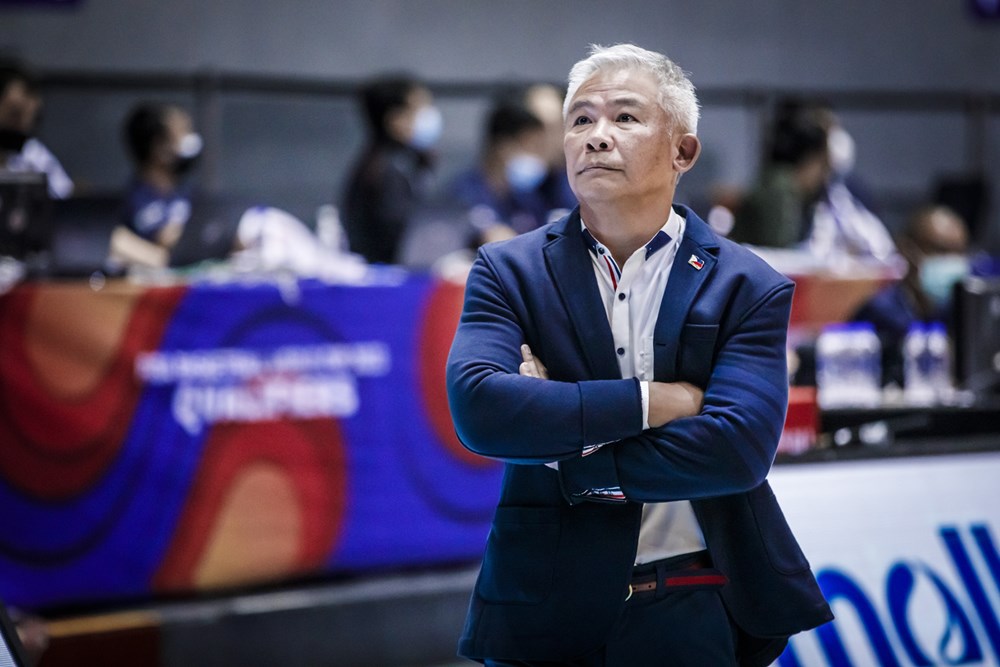
Gilas Pilipinas coach Chot Reyes. –FIBA.BASKETBALL
As the national basketball coach, Chot Reyes has had a difficult year.
In early March, as New Zealand was applying the final touches on an 88-63 rout of the Philippines in a Fiba World Cup qualifying match held here, several fans angrily left the game leaving chants of “We want Baldwin” to bounce around the walls of the Big Dome.
Those same fans were referring to Tab Baldwin, Reyes’ predecessor, who steered Gilas Pilipinas to two stirring and fan-adored victories en route to Asia Cup qualification.
“I didn’t hear it to be very honest,” Reyes said of the chants during a television interview later. “I expected it. I accepted this job with my eyes wide open. I knew I was going to get widely bashed, criticized, and hated upon and I still took it nonetheless because that’s never going to get in the way of my service for the country.”
He probably heard the jeers the next time around when less than three months later, the Philippines lost the gold in the Southeast Asian Games—that tiny pocket of competition where the country can still claim to be an undisputed powerhouse in the sport it adores almost unrequitedly.
“You all know what has been happening, right? With that [Southeast Asian Games] loss, I am today the most hated man in Philippine basketball,” Reyes said at the start of the PBA Philippine Cup.
The hate comes from two places.
First, it comes from the fact that basketball fans and Reyes are looking at results of Gilas Pilipinas games from too different—but equally high—perches. For fans, a loss flagellates not just a nation’s pride but also people’s intense devotion to the sport.
But perhaps as national coach of the country’s beloved sport, Reyes must understand that he can never truly serve only at the pleasure of his national federation.
For Reyes, every game—win or lose—is a step toward the real goal: To assemble a system and a collection of players that will fare creditably in next year’s Fiba World Cup. And he can sound coldly calculating when stressing on that fact.
Before departing for Indonesia for the Asia Cup, Reyes looked to manage people’s expectations right away.
“[W]e’re going to try our best to get to the Top 8, but the objective is to really look at the players we have in this team and see their continued development, and continue our process of finding out what’s going to take that we have the best team for 2023,” he told PBA reporters.
And there’s that second place where the hate comes from: Reyes’ inability to get that message across without offending fans’ sensitivities.
In reality, Chot Reyes is right.
Sources have told the Inquirer that the finance arm of the Fiba World Cup organizing committee is trying to slash P400 million from a budget that has already bloated to P1.3 billion.
With that much money involved (that’s only for local spending), and with the prestige of playing in the World Cup stage, every other tournament should be used to prepare Gilas Pilipinas for the global Fiba showcase.
What everyone’s hearing, however, is that every other tournament should ONLY be used to prepare Gilas Pilipinas for the global Fiba showcase.
On one hand, it could be the fans’ fault. After all, how many people have translated Reyes’ ‘Top 8’ and ‘2023 preparation’ quotes as ‘I’m not trying to win the Asia Cup’ and ran away with it?
On the other hand, Reyes can be sometimes dismissive of those who get sore after ever Gilas loss.
“To be honest, they don’t know what’s going on inside. Unless they are in the innards of the team, then whatever they say has very little meaning to me and I don’t pay any attention to it,” he said after those ‘We want Baldwin” chants.
“I serve at the pleasure of the SBP. I don’t serve at the pleasure of bashers and haters,” he said at the height of calls for his resignation after the SEA Games loss.
As Gilas Pilipinas plunges into Asia Cup competition, Reyes must remain undistracted from his goal of shaping the country’s 2023 Fiba World Cup team. Hate him if you must, but Reyes isn’t a roll-of-the-dice sub for Baldwin. He is a great coach who knows exactly what needs to be done on the court.
But perhaps as national coach of the country’s beloved sport, Reyes must understand that he can never truly serve only at the pleasure of his national federation.